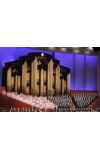
05 Oct 2011 09:12:19
Beginning this week, a dozen U.S. cities in seven states will be targeted by the Salt Lake City-based church with ads on television, city buses and billboards inviting visitors to the church's website to learn about its beliefs and followers.
Users who log onto mormon.org can see profiles of Mormons from various walks of life, chat with church members and learn about Mormon practices, such as the prohibition against consuming alcohol, coffee and tea.
"Many people are not familiar with our faith, and that can sometimes lead to misconceptions," said David Evans, an elder who oversees the church's global network of 52,000 missionaries. "The best way to understand Mormons is to meet them and get to know them personally. These ads are an invitation to do that."
The church, boasting a membership of 14 million worldwide, including 6 million U.S. followers, has gained new attention in the American mainstream this year from Broadway to the White House campaign trail.
Public opinion polls in recent years have shown large blocs of Americans hold an unfavorable view of the religion, whose image problems are partly rooted in the faith's historical connection with polygamy.
An early tenet of the Mormon faith, plural marriage was renounced by the church more than a century ago, although it is still practiced by members of some breakaway sects.
That legacy has drawn notice from the HBO series "Big Love," about a fictional polygamous family, and "Sister Wives," a reality show that follows an ad executive, the four women he calls his spouses and their children.
But the most common myth, according to church spokeswoman Eric Hawkins, is the perception among some that Mormons are not Christians.
"This will help them understand that we follow Jesus Christ," Hawkins told Reuters.
FROM BROADWAY TO THE PRIMARIES
The ads will run in Denver, Atlanta, Phoenix, Seattle, Spokane, Wash., Indianapolis, South Bend and Fort Wayne, Ind., San Antonio and Austin, Texas, and Omaha and Lincoln, Neb., through March 2012.
The campaign first surfaced in several other U.S. cities last year, including New York City.
While two Republican presidential hopefuls, former Massachusetts Governor Mitt Romney and former Utah Governor Jon Huntsman, are Mormon, their White House aspirations are coincidental to the church's outreach effort, Hawkins said.
A Gallup poll in June found one in five U.S. voters would oppose a Mormon candidate for president.
The church has long officially avoided taking a partisan role in politics, although it has weighed in on some hot-button social debates, notably its support for a 2008 California ballot measure outlawing same-sex marriage.
More recently, church members have largely embraced -- or at least taken in stride -- the affectionate parody of their faith in the Broadway musical hit "The Book of Mormon," a title taken from church's central volume of scripture.
The show, co-written by Matt Stone and Trey Parker, creators of the satiric television cartoon "South Park," swept the Tonys and produced the highest-charting Broadway soundtrack since "Hair" in 1969.
Film critics also have noted what they see as ample Mormon imagery and themes woven into the popular "Twilight" franchise of teen vampire movies based on the novels by Mormon author Stephenie Meyer. She has said such references are imagined.
The pop culture spotlight is a far cry from the fringe of American life occupied by the church at its founding in upstate New York in 1830 by Joseph Smith, regarded by Mormons as a prophet God commanded to restore the true church.
Hawkins said public service announcements by the church date to the 1970s, but the current campaign is taking it to a new level with modern technology.
Leah Brown of Mesa, Arizona, a Mormon who is participating in the program, said non-Mormons often "are hesitant to ask" about her faith.

